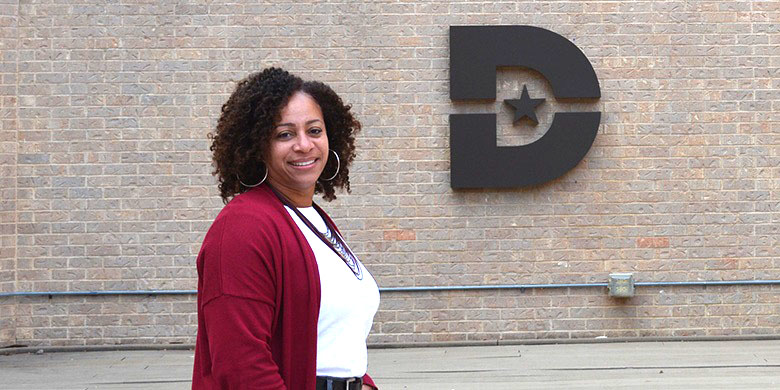Last updated on January 3, 2023
Danita Bradshaw-Ward, professor of biology at Dallas College’s Eastfield Campus, is passionate about empowering and encouraging underrepresented students to study science — in fact, she co-authored a book about it.
“Embracing STEM Smarts Volume 3,” created by Alexis Scott-Boster, shares stories from women in STEM, including Bradshaw-Ward. The book tells their journey in the field, what their challenges were and how they overcame them.
“It’s a guide for underrepresented populations,” said Bradshaw-Ward. “Women in STEM are few and far between in certain areas. It’s about women not being represented in the field, how we overcame that and what advice we’d give to those who want to go into this field but who may be discouraged.”
Breaking Barriers
Born and raised in Iowa, Bradshaw-Ward was the first in her family to earn a bachelor’s or master’s degree. And her educational journey began just like her students’ — at community college.
“It was the best experience, hands down. I enjoyed my time at the community college level — just the communication and interactions with teachers in smaller classrooms versus when I got to the university. It was so huge. I have a soft spot for community college.”
She transferred to Central Missouri State University (now the University of Central Missouri) on a full basketball scholarship where she graduated with a degree in biology. Her sights were set on medical school. Her plans changed, though, when she did not get accepted. Instead, she received a presidential fellowship to stay at Central Missouri State and pursue her master’s degree in biology with an emphasis in molecular biology.
Soon after graduating with her master’s degree, her husband’s job brought them to Dallas where she landed a position as a molecular DNA technician with the Baylor Institute of Metabolic Disease. While she enjoyed the research, she soon realized she needed more social interaction than being in a lab could provide. So, she decided to go back to school — either to try once more to get into medical school, or to become a physician’s assistant.
Realizing she had never actually taken Anatomy and Physiology 2 (she had taught the class as a graduate assistant but had never taken it), she enrolled at Eastfield where she took the class with Dr. Tammy Oliver.
“She asked me after I took her class, ‘Why are you in my class? You have a master’s degree…Come teach for me. I really think you’ll like it.’”
She started teaching the next semester. Now, Bradshaw-Ward is beginning her 18th year at Dallas College.
Making Connections
What she enjoys most about teaching at Dallas College is the ability to build a connection with her students and have an impact on those who are breaking barriers in their own right — whether that’s being the first in their family to attend college or overcoming other disadvantages to pursue their degree.
Her favorite class to teach is the same one that first brought her to Eastfield: Anatomy and Physiology 2. There, she focuses on helping students make the connection between all of her courses — Microbiology, Anatomy and Physiology 1 and Genetics — to discover how they all build off one another.
She also enjoys helping her students understand how biology impacts their lives outside of the classroom by applying what they are learning to everyday, real-life examples.
“What makes me excited about biology is the transferability — what we learn in the classroom and being able to apply it to our daily lives,” she said. “I love being able to make that connection and transfer the information to my students so it’s relevant.”
Today, Bradshaw-Ward is pursuing her doctorate at the University of North Texas, where she’s continuing to focus on the importance of representation in STEM.
“Representation was always something that was important to me. Now that I’m in this particular program, I see how much more it needs to be addressed,” she said. “I try to encourage my students. I was a little girl from Iowa in advanced AP classes and I looked around, and it was me and my friend. It was just us, and everybody else didn’t look like us. Sometimes it can be discouraging, and you feel like you have imposter syndrome, like you’re not supposed to be there. But you can do it, and you are supposed to be there.”
